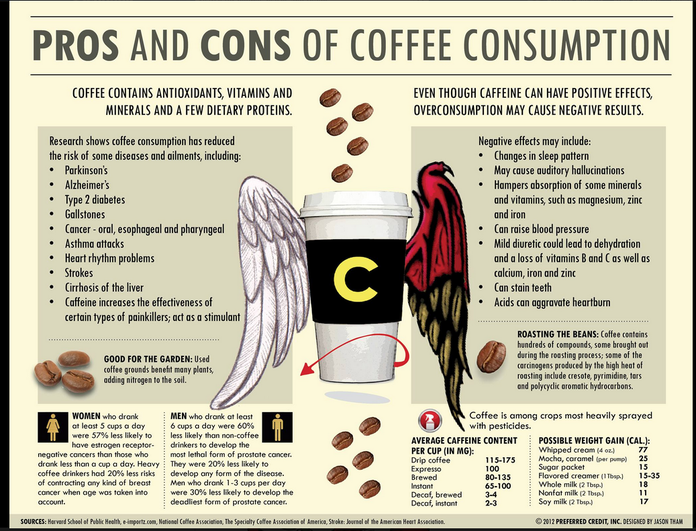Overview of the medical effects of coffee

Short snappers :
- 3 to 6 cups of coffee a day are supposed to help prevent Type 2 (Maturity Onset ) diabetes.
- each daily cup of coffee that you drink might decrease your risk of prostate cancer by 2%
- tea and coffee both have a minimal, but noticeable effect to lower blood pressure
- caffeine may help slow your mind from getting senile as you get older
Biochemistry of caffeine - click on the pic to learn more.

Here is Hank, telling you how coffee keeps you alert, is not addictive ( more like an ingrained habit ) and how it works on the adenosine receptors in your brain to keep you alert and focused.

Coffee decreases your chances of dying of Prostate Cancer.
Or to put it in a complicated way ....
Coffee consumption and risk of nonaggressive, aggressive and fatal prostate cancer - A dose-response meta-analysis
Annals of Oncology, 12/02/2013
Discacciati A, et al. – Existing epidemiological evidence is controversial regarding the possible associations between coffee consumption and risk of prostate cancer (PCa) by aggressiveness of the disease. Results from this dose–response meta–analysis suggest that coffee consumption may be inversely associated with the risk of fatal PCa. No clear evidence of an association with PCa incidence was observed.
Or to put it in a complicated way ....
Coffee consumption and risk of nonaggressive, aggressive and fatal prostate cancer - A dose-response meta-analysis
Annals of Oncology, 12/02/2013
Discacciati A, et al. – Existing epidemiological evidence is controversial regarding the possible associations between coffee consumption and risk of prostate cancer (PCa) by aggressiveness of the disease. Results from this dose–response meta–analysis suggest that coffee consumption may be inversely associated with the risk of fatal PCa. No clear evidence of an association with PCa incidence was observed.

Coffee prevents heart attacks, diabetes, and overall death. And is good for asthma, your guts, and your brain !
or, in medspeak
Effects of habitual coffee consumption on cardiometabolic disease, cardiovascular health, and all-cause mortality
JACC - Journal of the American College of Cardiology, 07/22/2013 Review Article
O’Keefe JH et al. – Coffee is the most widely consumed beverage in the United States (US) after water, and is the principal source of caffeine intake among adults. The possible advantages of regular coffee consumption have to be weighed against potential risks (which are mostly related to its high caffeine content) including anxiety, insomnia, tremulousness and palpitations, as well as bone loss and possibly increased risk of fractures.
or, in medspeak
Effects of habitual coffee consumption on cardiometabolic disease, cardiovascular health, and all-cause mortality
JACC - Journal of the American College of Cardiology, 07/22/2013 Review Article
O’Keefe JH et al. – Coffee is the most widely consumed beverage in the United States (US) after water, and is the principal source of caffeine intake among adults. The possible advantages of regular coffee consumption have to be weighed against potential risks (which are mostly related to its high caffeine content) including anxiety, insomnia, tremulousness and palpitations, as well as bone loss and possibly increased risk of fractures.
- The biological effects of coffee may be substantial and are not limited to the actions of caffeine.
- Coffee is a complex beverage containing hundreds of biologically-active compounds, and the health effects of chronic coffee intake are wide ranging.
- From a cardiovascular (CV) standpoint, coffee consumption may reduce the risks of type 2 diabetes mellitus (T2DM) and hypertension (HTN), as well as other conditions associated with CV risk such as obesity and depression; but it may adversely affect lipid profiles depending on how the beverage is prepared.
- Regardless, a growing body of data suggests that habitual coffee consumption is neutral to beneficial regarding the risks for a variety of adverse CV outcomes including coronary heart disease (CHD), congestive heart failure (CHF), arrhythmias, and stroke.
- Moreover, large epidemiological studies suggest that regular coffee drinkers have reduced risks for mortality—both CV and all-cause.
- The potential benefits also include protection against neurodegenerative diseases, improved asthma control, and lower risk of select gastrointestinal diseases.
- A daily intake of about 2 to 3 cups of coffee appears to be safe and is associated with neutral to beneficial effects for most of the studied health outcomes.
- However, most of the data on coffee’s health effects are based upon observational data, with very few randomized controlled studies, and association does not prove causation

Coffee cuts prostate cancer risk ( again ) !
Coffee and tea consumption in relation to prostate cancer prognosis
Cancer Causes and Control, 08/06/2013 Clinical Article
Geybels MS et al. – Bioactive compounds found in coffee and tea may delay the progression of prostate cancer. Results indicate that higher pre–diagnostic coffee consumption is associated with a lower risk of prostate cancer recurrence/progression. This finding will require replication in larger studies.
Results
• The analysis of coffee intake in relation to prostate cancer recurrence/progression included 630 patients with a median follow–up of 6.4 years, during which 140 prostate cancer recurrence/progression events were recorded.
• Approximately 61 % of patients consumed at least one cup of coffee per day.
• Coffee consumption was associated with a reduced risk of prostate cancer recurrence/progression; the adjusted HR for ≥4 cups/day versus ≤1 cup/week was 0.41 (95 % CI: 0.20, 0.81; p for trend = 0.01).
• Approximately 14 % of patients consumed one or more cups of tea per day, and tea consumption was unrelated to prostate cancer recurrence/progression.
Coffee and tea consumption in relation to prostate cancer prognosis
Cancer Causes and Control, 08/06/2013 Clinical Article
Geybels MS et al. – Bioactive compounds found in coffee and tea may delay the progression of prostate cancer. Results indicate that higher pre–diagnostic coffee consumption is associated with a lower risk of prostate cancer recurrence/progression. This finding will require replication in larger studies.
Results
• The analysis of coffee intake in relation to prostate cancer recurrence/progression included 630 patients with a median follow–up of 6.4 years, during which 140 prostate cancer recurrence/progression events were recorded.
• Approximately 61 % of patients consumed at least one cup of coffee per day.
• Coffee consumption was associated with a reduced risk of prostate cancer recurrence/progression; the adjusted HR for ≥4 cups/day versus ≤1 cup/week was 0.41 (95 % CI: 0.20, 0.81; p for trend = 0.01).
• Approximately 14 % of patients consumed one or more cups of tea per day, and tea consumption was unrelated to prostate cancer recurrence/progression.
Coffee may help prevent senility

Medscape Medical News > Psychiatry
Feb 04, 2013
Evidence from existing studies in humans suggests that caffeine may help ward off cognitive decline, particularly among women.
A systematic literature review of human studies examining the effect of caffeine or caffeine-rich beverages on cognitive decline revealed that there are only 6 prospective studies that have looked at the impact of caffeine across the spectrum of cognition.
"Across the 6 studies, we found modestly reduced rates of cognitive decline over median follow-up times ranging from 1.3 years to 10 years," the authors, led by Lenore Arab, PhD, from the David Geffen School of Medicine, University of California, Los Angeles, write.
The findings are published in the January issue of Advances in Nutrition.
" According to the investigators, there have been a number of animal studies indicating that caffeine may boost cognitive function. In addition, research in human populations has also suggested that coffee and tea drinkers may experience less cognitive decline as they age.
For instance, they note studies that show that global cognition scores in non-demented populations in northern Europe were positively correlated with tea intake. In addition, Asian studies of tea and cognition also suggest less cognitive impairment among tea drinkers.
However, the researchers note that such cross-sectional studies "are vulnerable to multiple biases, including the possibility that the drinking behavior may be a result of cognitive status instead of causally related."
To examine the strength of the association between tea, coffee, or caffeine consumption and the prevention of age-related cognitive decline, the investigators conducted a literature review.
The final analysis included 6 prospective, longitudinal studies published between 2003 and 2011 in which the Mini–Mental State Examination was used to establish baseline data of cognitive function and to measure cognitive function over time.
Follow-up in the studies ranged from 1.3 years to 10 years. Caffeine consumption ranged from 30 mg/week to 550 mg/week. Two studies analyzed coffee and tea consumption separately, and 1 study investigated only coffee.
All studies included in the analysis controlled for age and education. In addition, 5 studies controlled for smoking, sex, and a number of health variables.
Different outcome measures and exposure heterogeneity as well as the fact that there were not enough studies on a single exposure made it impossible to conduct a meta-analysis, the researchers report.
Despite these limitations, the investigators note that in general, "for all studies of tea and most studies of coffee and caffeine, the estimates of cognitive decline were lower among consumers, although there is a lack of a distinct dose response. Only a few measures showed a quantitative significance and, interestingly, studies indicate a stronger effect among women than men."
The translation - a little bit of coffee seems to keep you smarter as you get older. Especially if you are a women. ( But then women are often smarter anyway. )
Feb 04, 2013
Evidence from existing studies in humans suggests that caffeine may help ward off cognitive decline, particularly among women.
A systematic literature review of human studies examining the effect of caffeine or caffeine-rich beverages on cognitive decline revealed that there are only 6 prospective studies that have looked at the impact of caffeine across the spectrum of cognition.
"Across the 6 studies, we found modestly reduced rates of cognitive decline over median follow-up times ranging from 1.3 years to 10 years," the authors, led by Lenore Arab, PhD, from the David Geffen School of Medicine, University of California, Los Angeles, write.
The findings are published in the January issue of Advances in Nutrition.
" According to the investigators, there have been a number of animal studies indicating that caffeine may boost cognitive function. In addition, research in human populations has also suggested that coffee and tea drinkers may experience less cognitive decline as they age.
For instance, they note studies that show that global cognition scores in non-demented populations in northern Europe were positively correlated with tea intake. In addition, Asian studies of tea and cognition also suggest less cognitive impairment among tea drinkers.
However, the researchers note that such cross-sectional studies "are vulnerable to multiple biases, including the possibility that the drinking behavior may be a result of cognitive status instead of causally related."
To examine the strength of the association between tea, coffee, or caffeine consumption and the prevention of age-related cognitive decline, the investigators conducted a literature review.
The final analysis included 6 prospective, longitudinal studies published between 2003 and 2011 in which the Mini–Mental State Examination was used to establish baseline data of cognitive function and to measure cognitive function over time.
Follow-up in the studies ranged from 1.3 years to 10 years. Caffeine consumption ranged from 30 mg/week to 550 mg/week. Two studies analyzed coffee and tea consumption separately, and 1 study investigated only coffee.
All studies included in the analysis controlled for age and education. In addition, 5 studies controlled for smoking, sex, and a number of health variables.
Different outcome measures and exposure heterogeneity as well as the fact that there were not enough studies on a single exposure made it impossible to conduct a meta-analysis, the researchers report.
Despite these limitations, the investigators note that in general, "for all studies of tea and most studies of coffee and caffeine, the estimates of cognitive decline were lower among consumers, although there is a lack of a distinct dose response. Only a few measures showed a quantitative significance and, interestingly, studies indicate a stronger effect among women than men."
The translation - a little bit of coffee seems to keep you smarter as you get older. Especially if you are a women. ( But then women are often smarter anyway. )